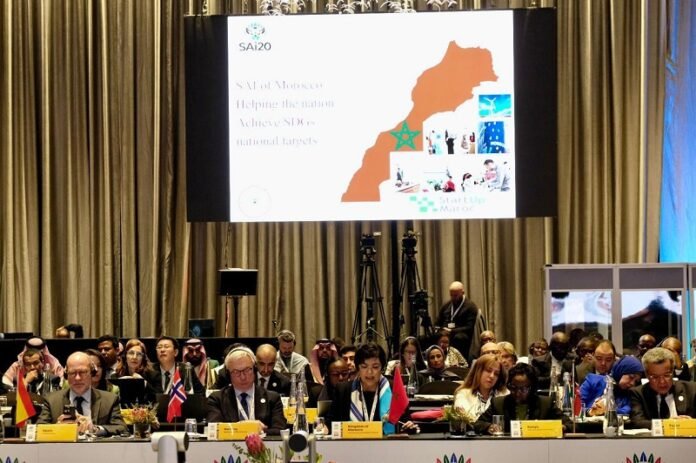In a highly symbolic move, Morocco’s full map — including the southern provinces — appeared alongside the national flag on the large screen during the Conference of Supreme Audit Institutions of the G20 countries, held in Johannesburg, South Africa, on June 24–25. The moment occurred during the speech of Zineb El Adaoui, First President of Morocco’s Court of Accounts.
This public and official display of Morocco’s full map on South African soil carries significant symbolic weight, especially considering South Africa’s longstanding support for the separatist Polisario Front. It signals a potential gradual shift in both the official and symbolic posture of this key African player regarding the Moroccan Sahara issue.
This development comes amid political changes in South Africa, notably the recent declaration by the “uMkhonto we Sizwe” (Spear of the Nation) party, led by former president Jacob Zuma, recognizing Morocco’s sovereignty over the Sahara and supporting the autonomy initiative as a practical solution to the conflict. The stance was detailed in a policy document titled: “Morocco and South Africa: A Strategic Partnership for African Unity and Economic Liberation.”
Morocco’s participation in this international forum, with its full territorial map prominently displayed, underscores the growing international momentum supporting its position on the Sahara, particularly the increasing number of countries backing the autonomy proposal under Moroccan sovereignty.
On another front, the Moroccan Court of Accounts’ third consecutive participation in this summit confirms the country’s growing presence within international audit and governance institutions. The conference addressed key issues such as infrastructure financing and capacity-building for future development — priorities that align closely with Morocco’s national agenda.
In her speech, El Adaoui emphasized the need for structural reform of the global financial system, highlighting concerns over debt sustainability in developing countries and the urgency of addressing climate change. She also pointed out weaknesses in infrastructure governance in low-income nations and the vital role of audit institutions in overcoming them.
She further presented Morocco’s efforts, under King Mohammed VI’s leadership, in implementing development strategies based on strengthening infrastructure and fostering public-private partnerships, noting how this vision is embedded in the 2022–2026 strategic plan of the Court of Accounts to improve public policy responsiveness to economic and social shifts.
Through this participation, Morocco strengthened its institutional visibility within the G20 framework. Zineb El Adaoui also held bilateral meetings with counterparts from Saudi Arabia, Brazil, Russia, Egypt, and Turkey, reinforcing Rabat’s dynamic strategy to foster intercontinental partnerships through institutional cooperation and knowledge exchange.




